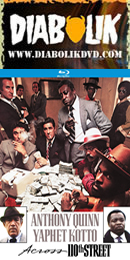
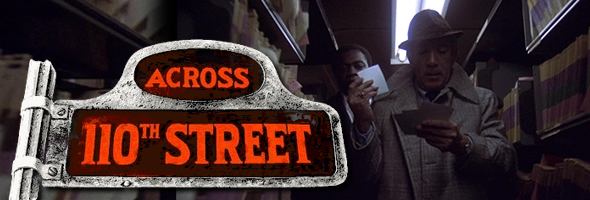
Color, 1972, 102m.
Directed by Barry Shear
Starring Anthony Quinn, Yaphet Kotto, Anthony Franciosa, Paul Benjamin, Ed Bernard, Antonio Fargas, Gloria Hendry
Kino Lorber (Blu-ray & DVD) (US RA/R1 HD/NTSC), MGM (DVD) (US R1 NTSC) / WS (1.85:1) (16:9)
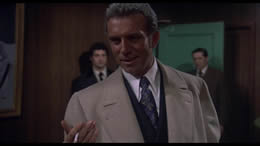
An effective and richly atmospheric New York crime film, Across 110th Street was packaged as an entry in the suddenly 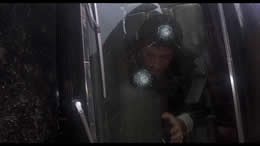 popular line of blaxploitation action films inaugurated the previous year by Shaft. That isn't entirely inaccurate given the elements in the film (including a great soul soundtrack by Shaft composer J.J. Johnson with a Bobby Womack theme song later popularized by Jackie Brown), but anyone expecting another trip around the block with someone like Super Fly or Truck Turner is in for a big surprise.
popular line of blaxploitation action films inaugurated the previous year by Shaft. That isn't entirely inaccurate given the elements in the film (including a great soul soundtrack by Shaft composer J.J. Johnson with a Bobby Womack theme song later popularized by Jackie Brown), but anyone expecting another trip around the block with someone like Super Fly or Truck Turner is in for a big surprise.
In the memorably violent opening, some mobsters sit around in a covert Harlem numbers room tallying up their latest haul. A knock on the door puts them on edge, especially when it turns out to be a couple of cops. As it turns out, the policemen (Benjamin and Bernard) are really robbers in disguise, but the hold up turns nasty and bullets are soon flying, leaving the mobsters all dead and the thieves hightailing it with their getaway driver (Fargas) and taking out a few police officers in the process. Soon a manhunt is escalating around Harlem with the mob bringing in racist enforcer Nick (Tenebrae's Franciosa) to take care of the culprits (and retrieve the mob's $300 grand) and two cops, older veteran Captain Mattelli (Quinn, also executive 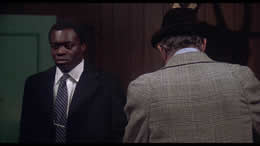 producer) and younger, more compassionate Lieutenant Pope (Live and Let Die's Kotto), trying their best to wade through a variety of colorful characters and prevent what looks like an inevitable bloodbath.
producer) and younger, more compassionate Lieutenant Pope (Live and Let Die's Kotto), trying their best to wade through a variety of colorful characters and prevent what looks like an inevitable bloodbath.
Despite the presence of the usually scenery-chewing Fargas (who went on to Foxy Brown and TV's Starsky and Hutch), this is a dead serious film with some of the best location shooting of Harlem from the era and solid, committed performances from all of the principles. Weirdly, there isn't a genuine "hero" role in the whole bunch; everyone has substantial issues to 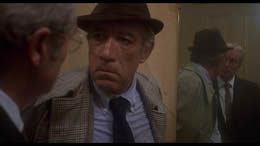 work through and seems to be fighting flaws both internal and external in a social tide that feels like it's sucking them all under. Fresh off of Larry Cohen's Bone, Kotto quickly found a niche here with his determined, stone-faced persona working as an advantage in gritty films like Report to the Commissioner and Blue Collar, though of course he managed to slip a comedy or two in there as well. Quinn was in a pretty strange place career-wise at the time as he was in between a couple of oddball counterculture parts (R.P.M. and Flap) and a colorful stint in Europe for much of the rest of the decade, and he makes the most of his role here as an authority figure who feels he's being pushed out by the next generation. Fans of '70s cinema should also keep an eye out for a number of familiar faces including another future Live and Let Die star, Gloria Hendry, and even a pre-Rocky Burt Young as one of the unlucky victims in the opening sequence.
work through and seems to be fighting flaws both internal and external in a social tide that feels like it's sucking them all under. Fresh off of Larry Cohen's Bone, Kotto quickly found a niche here with his determined, stone-faced persona working as an advantage in gritty films like Report to the Commissioner and Blue Collar, though of course he managed to slip a comedy or two in there as well. Quinn was in a pretty strange place career-wise at the time as he was in between a couple of oddball counterculture parts (R.P.M. and Flap) and a colorful stint in Europe for much of the rest of the decade, and he makes the most of his role here as an authority figure who feels he's being pushed out by the next generation. Fans of '70s cinema should also keep an eye out for a number of familiar faces including another future Live and Let Die star, Gloria Hendry, and even a pre-Rocky Burt Young as one of the unlucky victims in the opening sequence.
Though it was picked up by United Artists and stars a two-time Oscar winner, Across 110th Street has usually been treated as an exploitation programmer since its initial theatrical bookings and has enjoyed a spotty history on home video with several gaps of unavailability here and there. Key Video briefly issued it as a pricey VHS in the '80s, with a cheaper option from MGM coming as part of its Soul Cinema line on both VHS and DVD in 2002. The 2014 edition from Kino Lorber comes in both Blu-ray and DVD iterations, though the former is definitely the way to go if possible. It's about as crisp a rendering as you could probably get for a film shot with such an intentionally dark, grimy aesthetic, and while there's some minor element damage here and there, it's generally in fine shape and better than the repertory prints that pop up now from time to time, most of which are borderline unwatchable now. The DTS-HD mono track sounds fine and capably handles the memorable music in particular; the sole extra is the theatrical trailer, which does its best to consolidate the plot and broad cast of characters into a punchy couple of minutes.
Reviewed on February 16, 2015.






